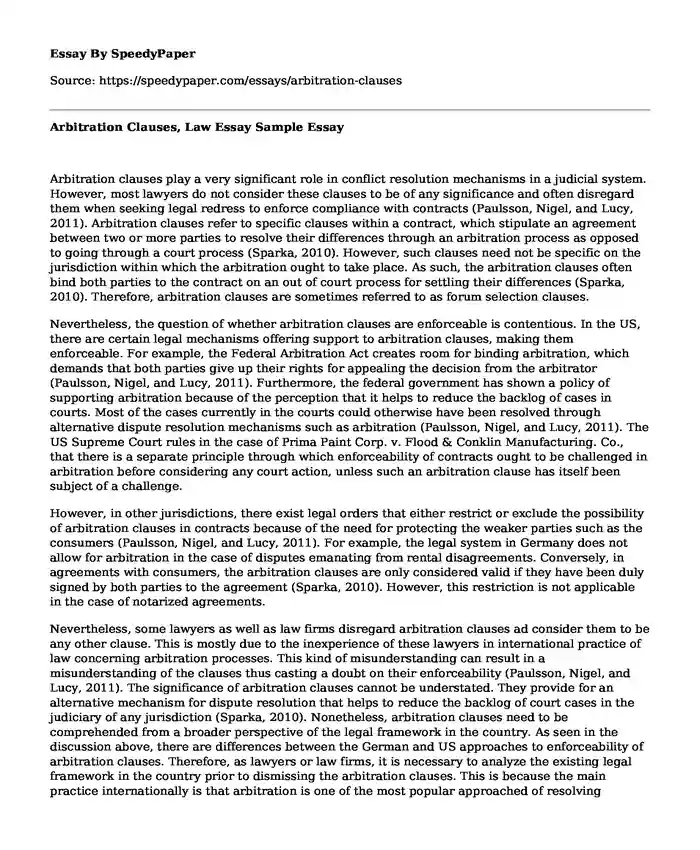Arbitration clauses play a very significant role in conflict resolution mechanisms in a judicial system. However, most lawyers do not consider these clauses to be of any significance and often disregard them when seeking legal redress to enforce compliance with contracts (Paulsson, Nigel, and Lucy, 2011). Arbitration clauses refer to specific clauses within a contract, which stipulate an agreement between two or more parties to resolve their differences through an arbitration process as opposed to going through a court process (Sparka, 2010). However, such clauses need not be specific on the jurisdiction within which the arbitration ought to take place. As such, the arbitration clauses often bind both parties to the contract on an out of court process for settling their differences (Sparka, 2010). Therefore, arbitration clauses are sometimes referred to as forum selection clauses.
Nevertheless, the question of whether arbitration clauses are enforceable is contentious. In the US, there are certain legal mechanisms offering support to arbitration clauses, making them enforceable. For example, the Federal Arbitration Act creates room for binding arbitration, which demands that both parties give up their rights for appealing the decision from the arbitrator (Paulsson, Nigel, and Lucy, 2011). Furthermore, the federal government has shown a policy of supporting arbitration because of the perception that it helps to reduce the backlog of cases in courts. Most of the cases currently in the courts could otherwise have been resolved through alternative dispute resolution mechanisms such as arbitration (Paulsson, Nigel, and Lucy, 2011). The US Supreme Court rules in the case of Prima Paint Corp. v. Flood & Conklin Manufacturing. Co., that there is a separate principle through which enforceability of contracts ought to be challenged in arbitration before considering any court action, unless such an arbitration clause has itself been subject of a challenge.
However, in other jurisdictions, there exist legal orders that either restrict or exclude the possibility of arbitration clauses in contracts because of the need for protecting the weaker parties such as the consumers (Paulsson, Nigel, and Lucy, 2011). For example, the legal system in Germany does not allow for arbitration in the case of disputes emanating from rental disagreements. Conversely, in agreements with consumers, the arbitration clauses are only considered valid if they have been duly signed by both parties to the agreement (Sparka, 2010). However, this restriction is not applicable in the case of notarized agreements.
Nevertheless, some lawyers as well as law firms disregard arbitration clauses ad consider them to be any other clause. This is mostly due to the inexperience of these lawyers in international practice of law concerning arbitration processes. This kind of misunderstanding can result in a misunderstanding of the clauses thus casting a doubt on their enforceability (Paulsson, Nigel, and Lucy, 2011). The significance of arbitration clauses cannot be understated. They provide for an alternative mechanism for dispute resolution that helps to reduce the backlog of court cases in the judiciary of any jurisdiction (Sparka, 2010). Nonetheless, arbitration clauses need to be comprehended from a broader perspective of the legal framework in the country. As seen in the discussion above, there are differences between the German and US approaches to enforceability of arbitration clauses. Therefore, as lawyers or law firms, it is necessary to analyze the existing legal framework in the country prior to dismissing the arbitration clauses. This is because the main practice internationally is that arbitration is one of the most popular approached of resolving disputes.
References
Paulsson, J., Nigel R., and Lucy R. (2011). The Freshfields guide to arbitration clauses in international contracts. Alphen aan den Rijn: Kluwer Law International.
Sparka, F. (2010). Jurisdiction and arbitration clauses in maritime transport documents: a comparative analysis. Heidelberg: Springer.
Cite this page
Arbitration Clauses, Law Essay Sample. (2019, Jun 25). Retrieved from https://speedypaper.com/essays/arbitration-clauses
Request Removal
If you are the original author of this essay and no longer wish to have it published on the SpeedyPaper website, please click below to request its removal:
- Free Essay Example on Strategic Management Process
- Essay Sample on Differences of Collaboration in Information Visualization
- Geography Essay Sample: Belgium. Quebec Province.
- Essay Sample Dedicated to the Conflict Between Turkey and ISIL
- Free Essay on How the Book The Constitution Cafe Changed My Views on Our Constitution and Government
- Personal Leadership Portrait, Free Essay Example
- Free Essay. Media Semiotic Analysis with Embedded Research
Popular categories





